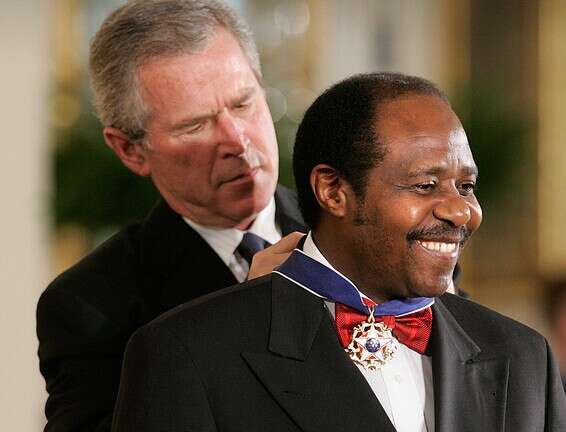Paul Rossavgina, who assisted in rescuing about a thousand Tutsi people during the massacre that killed nearly a million people, was brought to court in Kigli and charged with planning and financing terrorist acts
Paul Rossavgina with his arrest in Kigley // Photo: Reuters
A court in Kigali, the capital of Rwanda, today (Monday) read out the charges against Paul Rossavgina, who is considered the hero of the Rwandan genocide that saved the lives of nearly a thousand people at the Mill Collins Hotel during the 1994 genocide in the country.
Rossavgina was accused of planning and financing terrorist acts and belonging to armed groups.
He was brought to court with his head huddled in a sack and refused to comment in the media.
Rossabgina is known as a sharp critic of the regime of Paul Kagma, the current president of Rwanda, and has often been accused of committing "genocide against me" against the Hutu.
[video]
Rossavgina lived for years in exile in Belgium and the United States and was severely criticized for his conduct during the genocide.
Among other things, Rossavgina was charged with paying for the lives of about a thousand Tutsi refugees who were sheltered at the Mill Collins Hotel in the capital Kigli during the genocide and that he himself identified with regime officials but protected his Tutsi relatives themselves.
For years, Rossavgina denied the allegations, some of which were heard from the survivors themselves, and stuck to a story he told academic Philip Gurevitch and eternity in the Hollywood film "Rwanda Hotel."
According to the story, Rossavgina protected about 1,200 Tutsi people who came to the hotel he ran and even risked his life when he confronted the killers and tried to bribe them.
On the allegations against him that he transferred funds to a terrorist group in the Congo that is working against the government, Rossavgina said that these are "lies that are heard from Kigli, lies that do not even make any sense behind them."
International sources claim that the conflict between President Kagma and Rossabgina is not related to the latter's involvement in terrorism or opposition to the regime, but to Kigli's desire to completely control the narrative of genocide and the increasingly authoritarian nature of Kagma's government. .
The genocide in Rwanda took place in 1994 and killed close to a million Tutsi and moderate Hutu people.
The genocide was planned by government officials and President Jubenal of Bairmana, and was carried out after an assassination attempt on his life, which, according to international investigators, was carried out by his own military personnel.
The genocide was prepared months in advance and special militias were set up to eliminate the entire Tutsi population in the country, by simple means like machetes and pistols.
The killers moved fast.
The first to be eliminated were opposition leaders, most of them members of the Hutu majority group, who opposed the genocide.
The prime minister was assassinated in front of her home along with UN soldiers guarding her. Few members of the opposition managed to escape. When the skilled assassins finished their work, it was the turn of the militia and the incited mob to begin the wholesale killing of the Tutsis.
The killers went from house to house with lists, destroying family after family.
Anyone who managed to escape from his home very quickly encountered a checkpoint of militia members, where he was required to present a certificate that immediately revealed his identity.
The bodies began to pile up.
Hundreds, thousands, tens of thousands.
In the Kigley Center alone, a quarter of a million people were murdered.
The bodies were transported to a hill on the outskirts of the city, where they were poured into pits that became mass graves.

